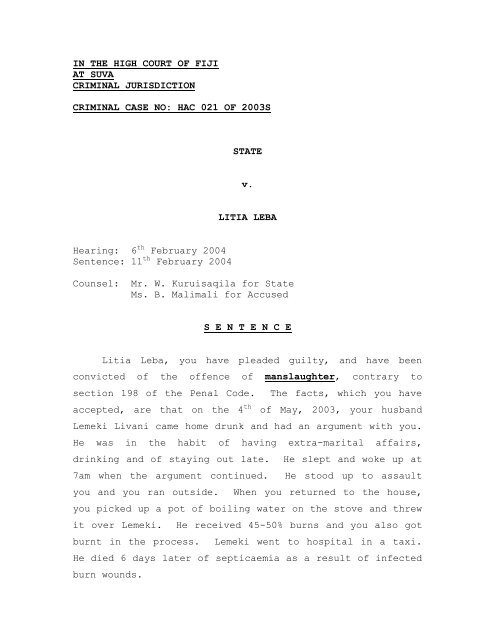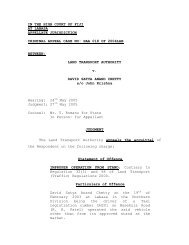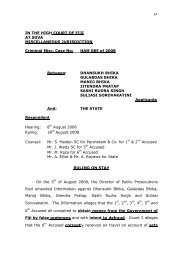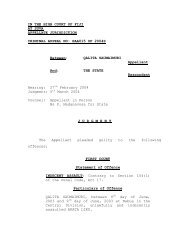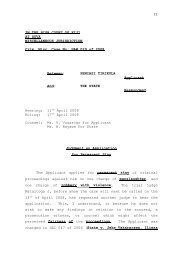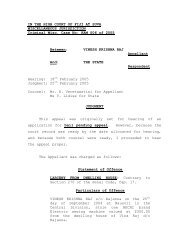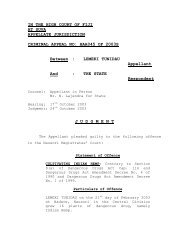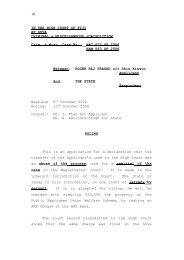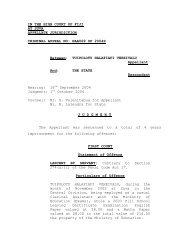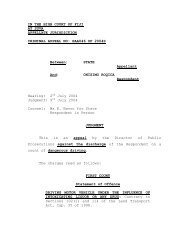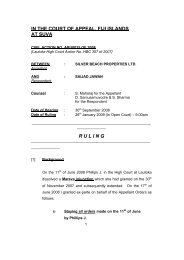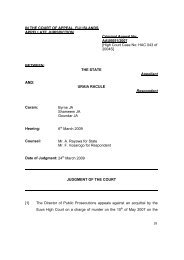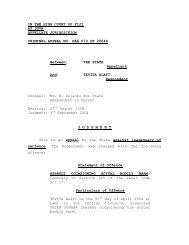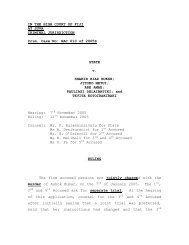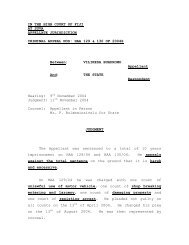Download State v Litia Leba Judgement - Law Fiji
Download State v Litia Leba Judgement - Law Fiji
Download State v Litia Leba Judgement - Law Fiji
You also want an ePaper? Increase the reach of your titles
YUMPU automatically turns print PDFs into web optimized ePapers that Google loves.
IN THE HIGH COURT OF FIJI<br />
AT SUVA<br />
CRIMINAL JURISDICTION<br />
CRIMINAL CASE NO: HAC 021 OF 2003S<br />
STATE<br />
v.<br />
LITIA LEBA<br />
Hearing: 6 th February 2004<br />
Sentence: 11 th February 2004<br />
Counsel: Mr. W. Kuruisaqila for <strong>State</strong><br />
Ms. B. Malimali for Accused<br />
S E N T E N C E<br />
<strong>Litia</strong> <strong>Leba</strong>, you have pleaded guilty, and have been<br />
convicted of the offence of manslaughter, contrary to<br />
section 198 of the Penal Code. The facts, which you have<br />
accepted, are that on the 4 th of May, 2003, your husband<br />
Lemeki Livani came home drunk and had an argument with you.<br />
He was in the habit of having extra-marital affairs,<br />
drinking and of staying out late. He slept and woke up at<br />
7am when the argument continued. He stood up to assault<br />
you and you ran outside. When you returned to the house,<br />
you picked up a pot of boiling water on the stove and threw<br />
it over Lemeki. He received 45-50% burns and you also got<br />
burnt in the process. Lemeki went to hospital in a taxi.<br />
He died 6 days later of septicaemia as a result of infected<br />
burn wounds.
2<br />
On your behalf you yourself gave evidence of your<br />
unstable marriage, frequent assaults, and on-going<br />
infidelities. You also gave evidence that Lemeki left you<br />
in the past, to bring up your son alone, and that you<br />
worked in a garment factory to survive. You also gave<br />
evidence that he frequently assaulted you and that on the<br />
4 th of May you suddenly lost control and threw the water<br />
over him in anger. You had never reported his assaults on<br />
you to the police because of shame and fear.<br />
Your sister-in-law Ana Waisale and your landlord<br />
Mahendra Prasad gave evidence which supported what you<br />
said. Your counsel has urged me also to read the statement<br />
of Lemeki Junior, your son, on the depositions. I have<br />
done so. He also said that throughout his life he can<br />
recall frequent arguments about his father’s infidelities,<br />
and that every argument concluded with an assault by his<br />
father on you.<br />
I note that you visited Lemeki in hospital every day<br />
before his death, that you took his dinner daily and spent<br />
every night at his side. I also accept that before his<br />
death, you and Lemeki apologised to each other and<br />
reconciled, and that Lemeki forgave you for what you had<br />
done. All this is not only before me in sworn evidence,<br />
but is also contained in the statement you gave to the<br />
police on the 11 th and 13 th of May 2003.<br />
The tariff for manslaughter in <strong>Fiji</strong> is a suspended<br />
sentence to 12 years imprisonment. (Shashi Kapoor Rayan<br />
–v- <strong>State</strong> Crim. App. AAU0028 of 2000S.) Sentences at the
3<br />
lower end of the scale are reserved for those cases where<br />
the violence used was minimal and the provocation offered<br />
was grave. In Shashi Kapoor, the Court of Appeal noted<br />
that sentences for manslaughter of a serious kind range<br />
from 7 to 10 years.<br />
With the wide range in the tariff, picking a starting<br />
point can become fraught with value judgments as to what a<br />
“serious” manslaughter is.<br />
Objectively, this is a serious case of manslaughter.<br />
The throwing of boiling water on another person cannot fall<br />
into the same category of a “single punch” or a drunken<br />
brawl manslaughter. No matter how grave the provocation, a<br />
starting point lower than 3 years imprisonment would be<br />
difficult to justify, particularly when the deceased died a<br />
painful death 6 days after the event. I therefore start at<br />
3 years imprisonment.<br />
There are compelling mitigating circumstances. One is<br />
your justifiable anger about the deceased’s cavalier<br />
treatment of you, his infidelities and his continuous<br />
violent conduct. Another is the fact that it was when he<br />
stood to strike you that you threw the boiling water on<br />
him. Undoubtedly you knew of the assault that was about to<br />
be inflicted on you. Another mitigating factor is your<br />
remorse, and the way in which you demonstrated that remorse<br />
in your nightly visits to your husband at the hospital.<br />
Finally, I take into account your guilty plea and previous<br />
good character.
4<br />
For all these matters, I reduce your sentence to 18<br />
months imprisonment. Is this a case for suspension? I note<br />
that section 29(3) of the Penal Code provides a legislative<br />
disapproval of suspending sentences in cases of violence. I<br />
also take into account the plight of your 10 year old son,<br />
whom you are supporting and educating alone. His welfare<br />
is a primary consideration in this case.<br />
Finally, I consider the fact that your act of violence<br />
was committed after years of emotional and physical abuse<br />
in the hands of the deceased. There is no expert evidence<br />
before me as to whether your case falls into the category<br />
often referred to by criminologists as “the battered wife<br />
syndrome.” However I find in your case that some of the<br />
characteristics, usually present in cases of victims of<br />
abusive relationships, are present. The characteristics<br />
usually found are:<br />
1. The victim is ashamed and afraid of<br />
reporting the abuse;<br />
2. The victim tends to relive her<br />
experiences and if put in fear, her<br />
thinking may not be clear and rational;<br />
3. The victim is acutely aware of any<br />
signal of danger from her partner;<br />
4. The victim stays in the abusive<br />
relationship because she fears that the<br />
partner will find her or take revenge;<br />
5. The victim may believe that she will one<br />
day be killed by her partner.<br />
(Osland v. The Queen (1998) HCA 75 High Court<br />
of Australia)
5<br />
In an article in the Otago <strong>Law</strong> Review, Robertson J<br />
(Battered Women Syndrome: Expert Evidence In Action Otago<br />
<strong>Law</strong> Review 1998 Vol. 9 No. 2), said that the question of<br />
whether the “battered woman syndrome” applied to the facts<br />
of any case, either in relation to the defence of<br />
provocation or of self-defence, depended on whether the<br />
defences could accommodate the length and nature of the<br />
abuse. In particular courts usually had to consider expert<br />
evidence about whether a “cycle of violence” existed as it<br />
did in a classic case of domestic violence.<br />
This is not an appropriate case to consider whether<br />
such a cycle existed in your case. You are not on trial,<br />
and the question of the abuse you suffered is relevant only<br />
to the sentence I must impose on you.<br />
In R –v- Wang (1989) 2 NZLR 529, the Court of Appeal<br />
considered a five year sentence imposed on a woman who<br />
stabbed her husband while he was asleep, and who was<br />
convicted of manslaughter. He had made threats to kill her<br />
before he fell asleep, and there was medical evidence that<br />
the accused was suffering from depression at the time. The<br />
trial judge found that there was no remorse, and no<br />
acceptance of other options available to her, in hindsight.<br />
The Court of Appeal held that the sentence was not<br />
excessive.<br />
In R –v- Ross (1992) 9 CRNZ 55, a 12 month sentence<br />
for manslaughter was quashed and substituted with a 4 year<br />
term where the accused killed the deceased, her partner<br />
after an unstable relationship over some years, and where
6<br />
the Court held that the offence had been planned and<br />
deliberated and had not resulted from mental disorder.<br />
In <strong>State</strong> v. Prabha Wati Case No. 0009 of 1999L Prakash<br />
J found that the accused, who pleaded guilty to<br />
manslaughter, had been subjected to 35 years of sexual,<br />
mental and physical abuse, that her case was a case of<br />
continued spousal abuse causing the accused to suddenly<br />
retaliate, and that in those circumstances, a sentence of 2<br />
years suspended for 2 years was the appropriate sentence.<br />
The question of suspension must therefore rest on the<br />
peculiar circumstances of the case. In your case, I accept<br />
the lack of planning, the sudden “snap” after years of<br />
emotional and physical abuse, the anticipation of assault<br />
when the deceased stood up, your remorse and the welfare of<br />
your child. In all these circumstances I consider it just<br />
to suspend your sentence for two years.<br />
You are sentenced to 18 months imprisonment suspended<br />
for 2 years. If you re-offend within the next two years<br />
you may be sentenced to serve the 18 months I have imposed<br />
today together with the term imposed for the new offence.<br />
…………………………………………………<br />
Nazhat Shameem<br />
JUDGE<br />
At Suva<br />
11 th February 2004


